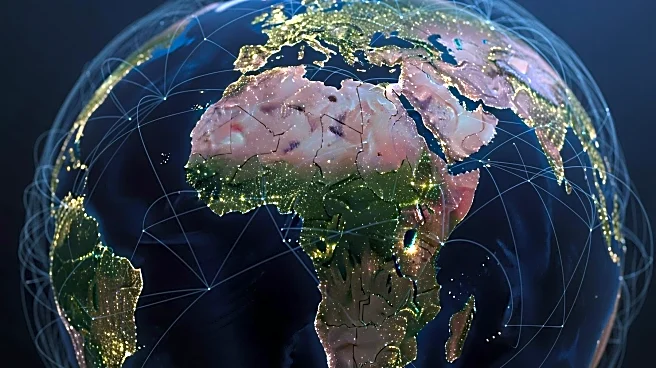What's Happening?
The International Monetary Fund (IMF) has released its October 2025 World Economic Outlook, projecting a slowdown in global growth from 3.3% in 2024 to 3.1% in 2026. Advanced economies are expected to grow modestly
at around 1.5%, while emerging markets and developing economies may see slightly stronger growth above 4%. The report highlights inflationary pressures, with the United States experiencing persistent consumer demand and labor market strength, leading to inflation above target levels. Meanwhile, Africa's GDP is projected to reach approximately $3.32 trillion in 2026, driven by foreign investment inflows and post-pandemic recovery. Investment activity in Africa has been robust, with significant construction contracts signed with China, including infrastructure projects in Nigeria and Egypt.
Why It's Important?
The IMF's projections underscore the divergent growth paths between advanced and emerging economies, with Africa playing an increasingly significant role in global trade realignment. The continent's economic expansion presents opportunities for foreign investors, particularly in infrastructure development. However, Africa faces structural challenges, including an annual infrastructure financing gap of $108 billion, policy uncertainty, and high youth unemployment. The U.S. economy remains a global anchor, but its growth forecast has been revised downward due to trade tensions and rising consumer prices. These dynamics could influence global economic policies and investment strategies, affecting stakeholders across industries.
What's Next?
As Africa continues to attract global attention, sustained investment in transport, energy, and digital connectivity will be crucial to overcoming structural challenges. The continent's growth trajectory may reshape global supply networks, with additional capital inflows expected from Europe, the Middle East, and Asia. For the U.S., addressing inflation and trade tensions will be key to maintaining its economic stability. Policymakers and businesses worldwide will need to adapt to these evolving economic conditions, potentially leading to shifts in trade alliances and investment priorities.
Beyond the Headlines
Africa's economic growth could lead to long-term shifts in global trade patterns, with the continent becoming a more integral part of international supply chains. This development may also influence cultural and social dynamics, as increased foreign investment could drive urbanization and technological advancements. Ethical considerations around investment practices and resource management will be important as Africa navigates its growth challenges.








